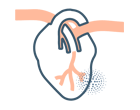Panel de precisión de arritmias
Las arritmias son un grupo de afecciones en las que existe una alteración en la frecuencia o el ritmo cardíaco. El corazón puede latir demasiado rápido, demasiado lento o con un ritmo irregular. Las arritmias son causadas por cambios en el tejido y la actividad del corazón o en las señales eléctricas que controlan los latidos del corazón.





